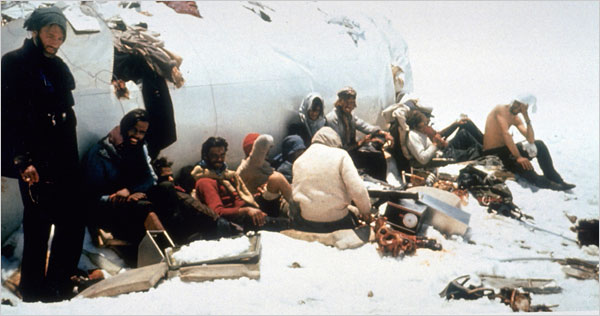Director: Gonzalo Arijon,
Watched on: DVD,
Rating: 4.5/5.
Documentary gatekeepers—the distributors and film festival programmers who get to decide what docs are worthy of their audiences—will tell you that the most important quality they look for in a film is access, meaning the access the filmmakers have to elements of their story no one else has. This all too often leads to a sacrifice of craft and artistry for the sake of the more sensational aspects of subject matter, but in the case of the excellent documentary, Stranded: I Have Come From A Plane That Crashed on the Mountains, the opposite is true. Yes, the director had an envious amount of access to the characters and the archival footage used in the film, but out of that familiarity he constructed a stirring, spellbinding meditation on the soul’s unquenchable thirst for life, especially when it competes with the serene temptations of a quiet, painless death.
Stranded recounts a story we’ve heard before: the tragic 1972 plane crash in the Andes that marooned a Uruguayan rugby team for 72 days. 16 young men survived only by resorting to cannibalism, eating the flesh of their dead teammates and friends. Their tale at first horrified the world, but when it quickly became clear that their survival depended on the sacrifice of the dead, and that they treated the act as almost a sacred ritual, their story evolved into a unique kind of heroism.
The film was directed by Gonzalo Arijon, a childhood friend of the survivors, who treks back into the mountains with the men to revisit the site of their ordeal. Many of the men bring their children, most of them teenagers now, along for the trip, which sets up a particularly poignant, even uplifting coda to the movie. Arijon also uses actors and a reconstructed crash site to stage blurry, black and white reenactments of the scene. These moments, used sparingly and shot at tilted angles, become jagged dream images, like the sudden bursts of a post-traumatic stress nightmare. But what elevates this movie far and above the expectations of your standard talking heads documentary—and there are plenty of them, since the entire story is told through the voices of the survivors—is the eloquent, honest, sometimes soaring poetic quality of their remembrances.
These men all came from upscale, educated backgrounds; they were pampered, city-bred and inexperienced, and they are intelligently recount their harrowing tale with an elegant, spiritual awareness. This is not a sordid tale of cannibalism, but a story of passage, from the ordered morality of civilization to the more primitive, stark morality of survival. The director and his editors crosscut with tense efficiency during these moments of self-revelation, sometimes lingering on a series of faces without a word being said to let the devastation of their decisions sink in.
As their hopes continue to dim, they begin to look at death as an attractive exit, the peace of giving up becoming more desirable than the enormous struggle to survive. And each man agrees that if they should die, they would consider it an honor for their friends to eat them to continue living. In this way, their sacrifice becomes a religious act, like Christ, offering their body and their blood to go on living in the souls and flesh of the survivors. In the movie’s final scenes, with the survivors surrounded by their children atop the mountain where these rituals were enacted, you can see the actual deliverance of that pact.

